The Department of Government Efficiency (DOGE) is tasked with streamlining government operations, reducing wasteful spending, and improving overall efficiency within the federal government. Spearheaded by Elon Musk, this initiative has the potential to significantly reshape the government contracting landscape and the business of many federal vendors. The TechnoMile Research team, leveraging data from GovSearchAI, has created an analysis that measures the relative impact of recent DOGE activity on federal contractors. TechnoMile’s analysis of the impact to these organizations includes our proprietary DOGE Impact Score.
Understanding the DOGE Impact Score
The DOGE Impact Score is calculated using unexercised ceiling and options value, which represents the difference between the total potential value of a federal contract and the amount of work that has, to date, been ordered and funded by an agency and publicly reported – in simple terms, it’s contract value that is not yet realized and therefore could be at risk.
TechnoMile’s proprietary DOGE Impact Score considers the unexercised ceiling and options value of a vendor’s contract(s) that are funded by a DOGE-impacted agency or program, relative to the aggregated unexercised ceiling and options value across all of a vendor’s existing awards across all federal agencies. The level of DOGE-related impact to each vendor’s federal business is derived and the vendor is assigned a DOGE Impact Score ranging from Very Low to Very High, as follows:
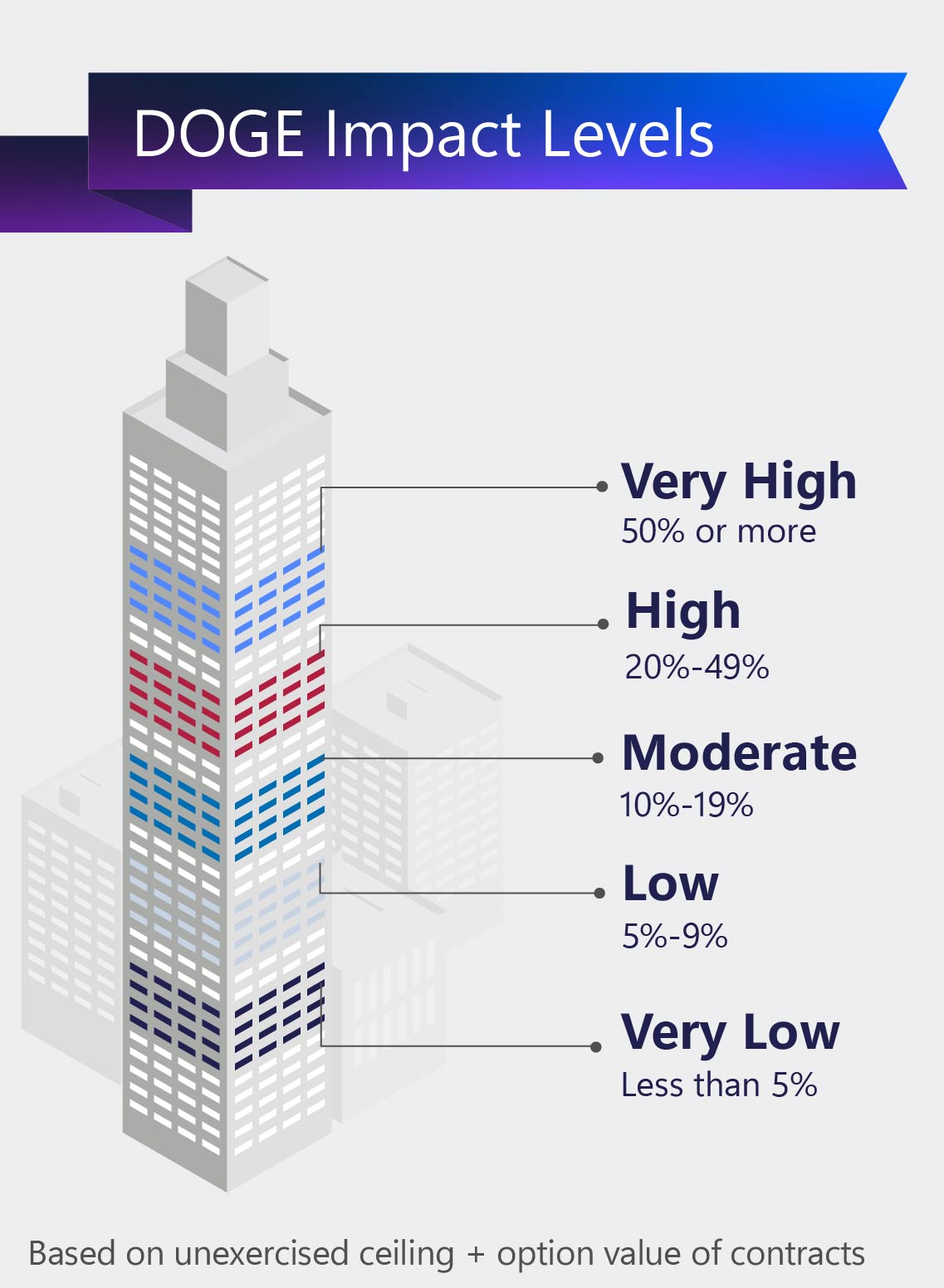
Because it’s rooted in the value of a vendor’s unexercised ceiling and options, TechnoMile’s DOGE Impact Score represents a valuable, forward-looking indicator of the impact of DOGE initiatives on a federal contractor’s business.
Summary of Analysis: Exposure at USAGM, MBDA, and Other Agencies Impacted by EO 14238
For this analysis, our team focused on vendors doing business with the seven agencies impacted by Executive Order 14238 – Continuing Reduction of the Federal Bureaucracy, issued on March 14, 2025. This Executive Order aims to eliminate the Federal Mediation and Conciliation Service (FMCS), the United States Agency for Global Media (USAGM), the Woodrow Wilson International Center for Scholars in the Smithsonian Institution, the Institute of Museum and Library Services (IMLS), the United States Interagency Council on Homelessness, the Community Development Financial Institutions Fund, and the Minority Business Development Agency (MBDA). Our Research team found that the lion’s share of contract spend associated with this group of agencies resides with the USAGM, MBDA, IMLS, and FMCS and therefore the subject of this analysis is the potential impact on federal contractors of these four agencies’ elimination.
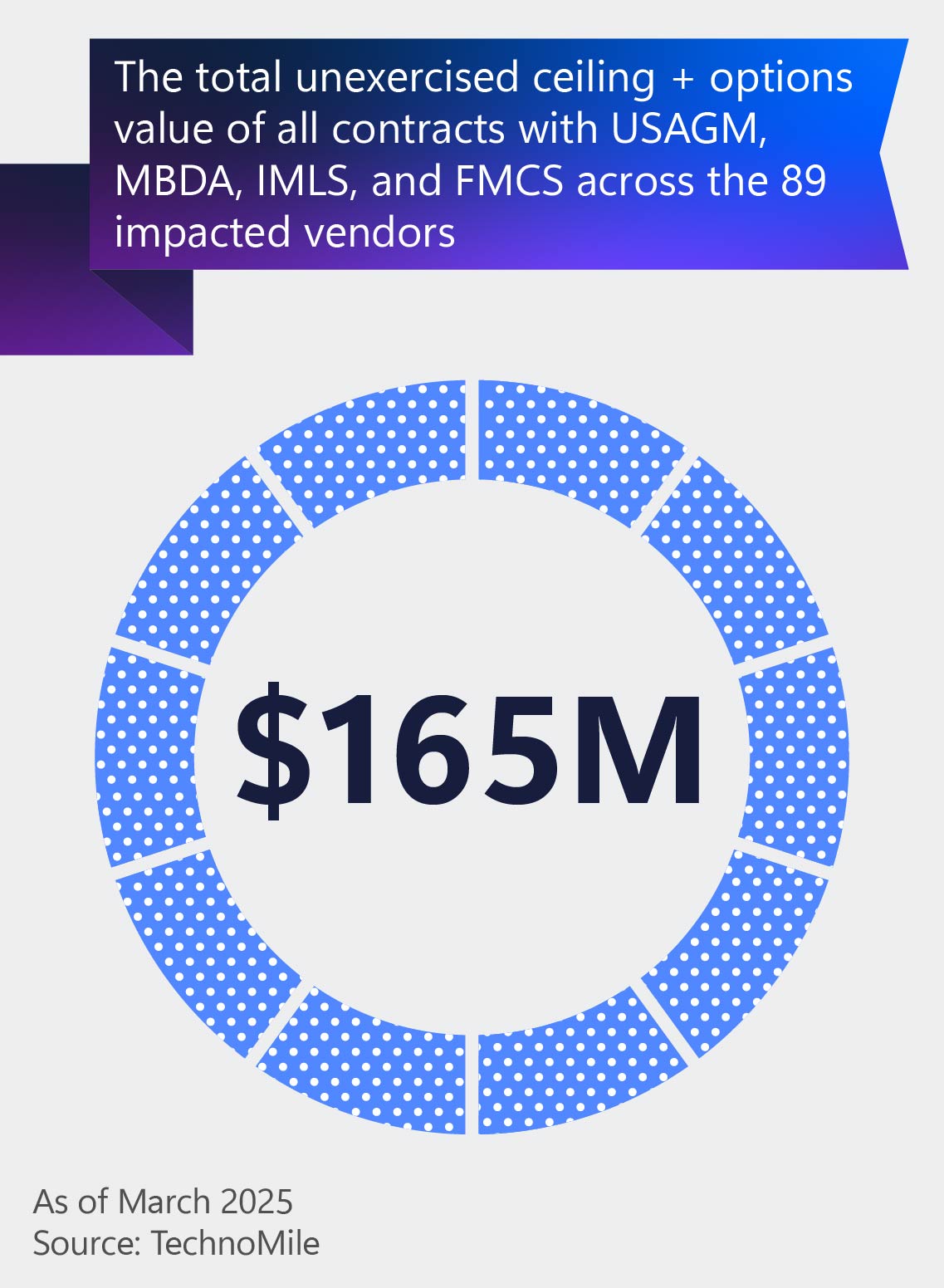
Our Research team identified 89 vendors doing business with the USAGM, MBDA, IMLS, and/or FMCS that have unexercised ceiling + options value at risk. The total unexercised ceiling + options value of all contracts with the four impacted agencies across 89 impacted vendors is $165M. The vast majority – 85% – of this total at-risk value represents exposure at the USAGM. The at-risk value breaks down as follows:
- USAGM – $140M total unexercised ceiling + options value of all contracts
- MBDA – $12.1M total unexercised ceiling + options value of all contracts
- IMLS – $10.6M total unexercised ceiling + options value of all contracts
- FMCS – $2.3M total unexercised ceiling + options value of all contracts
Among the 89 vendors that currently support the USAGM, MBDA, IMLS, and/or FMCS, here’s the breakdown of the level of impact to these companies at each agency if its contracts are cancelled:
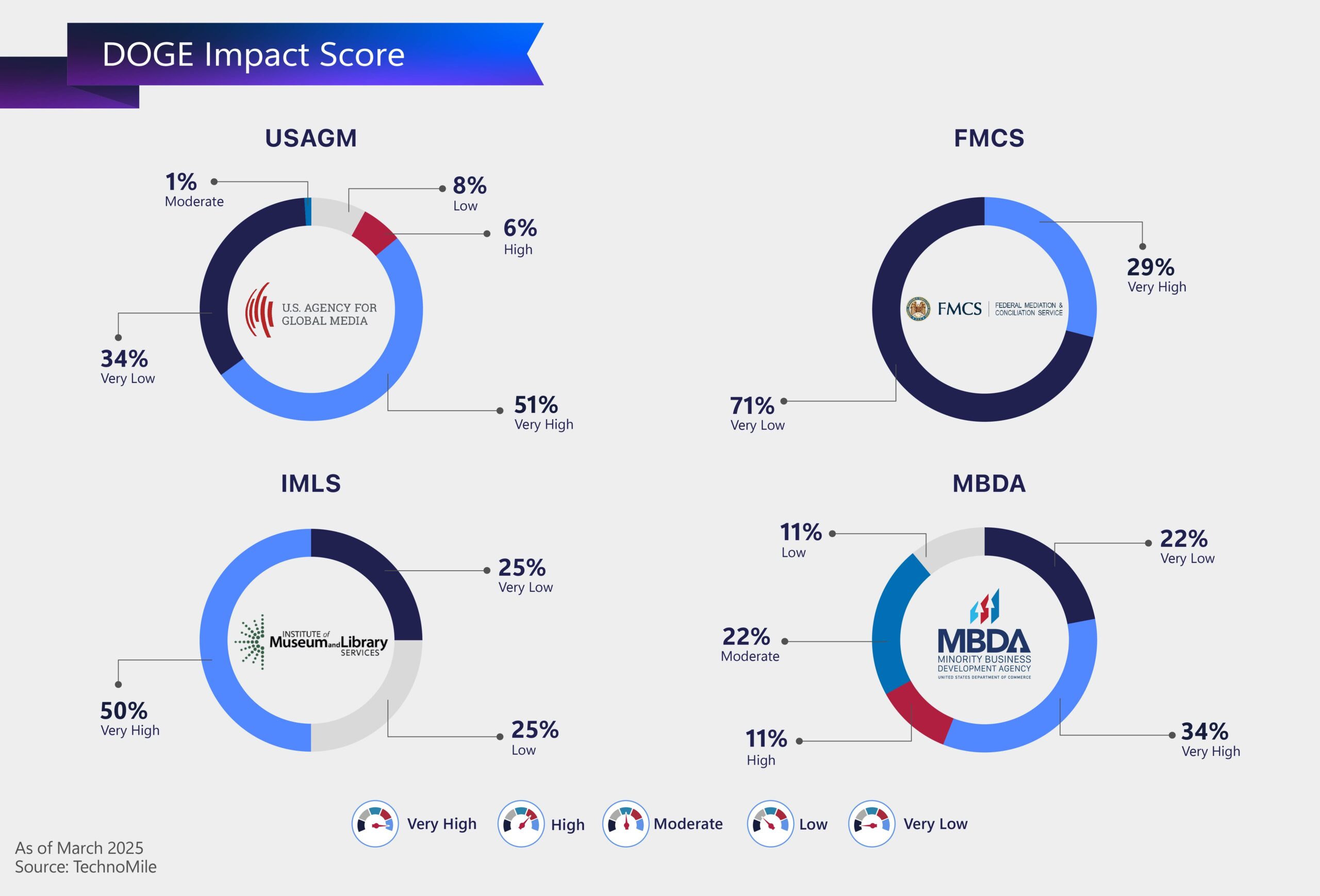
The USAGM and IMLS had the heaviest concentration of vendors – roughly 50% at each agency – that fall into the Very High Impact category, indicating the majority of their work is with these federal organizations that are slated for elimination. At MBDA and FMCS, there was less concentration in the Very High Impact category, at 34% and 29% of vendors, respectively.
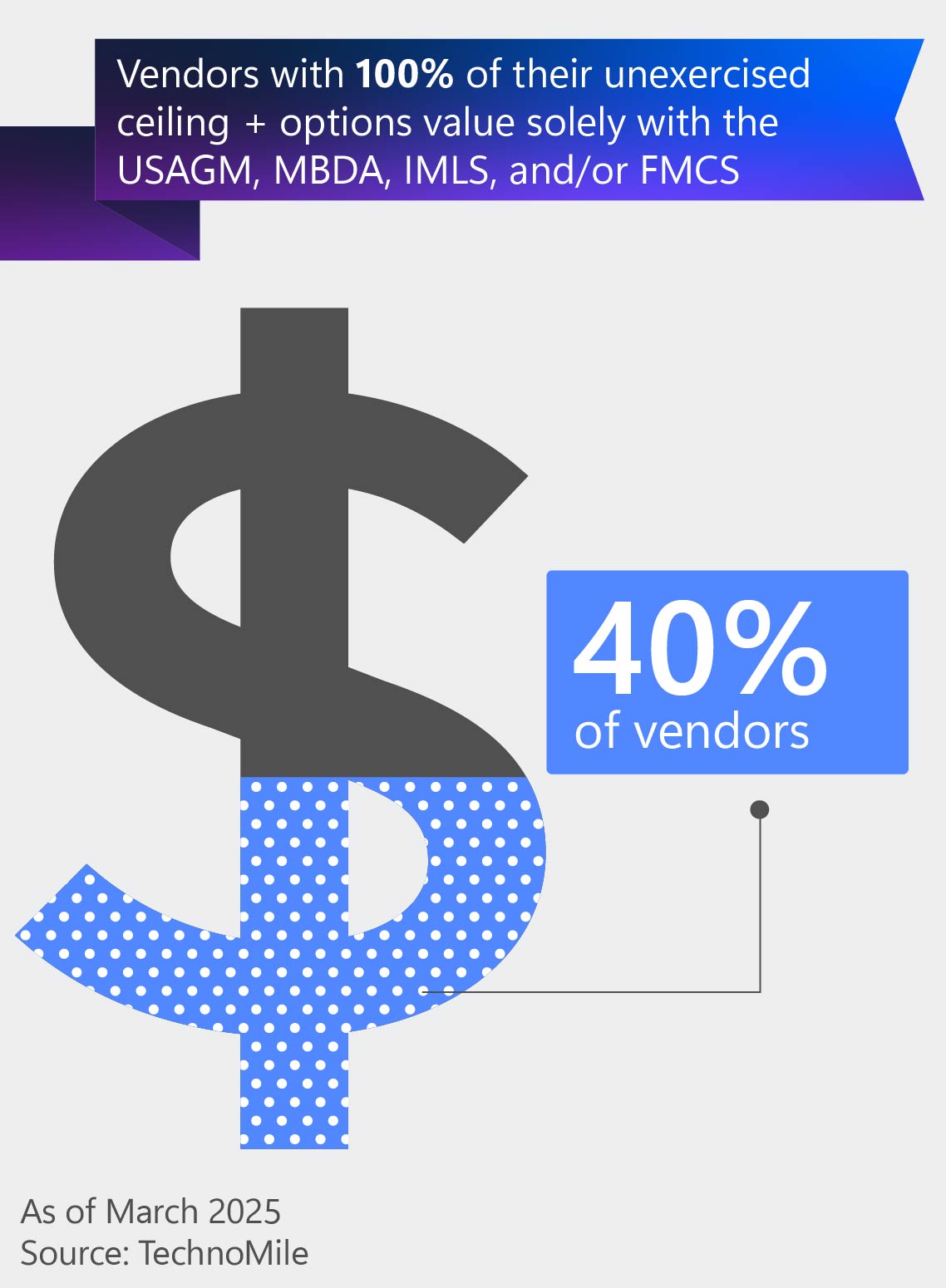
For 40% of the vendors we analyzed, contracts with these four agencies represent 100% of the unexercised ceiling + options value of their business’s contracts. These vendors must look at diversifying their work with other agencies/offices in order to decrease their DOGE Impact Score. Interested in the details behind these data points? Get a copy of the TechnoMile DOGE Impact Analysis: USAGM, MBDA, and Other Agencies Impacted by EO 14238 here.
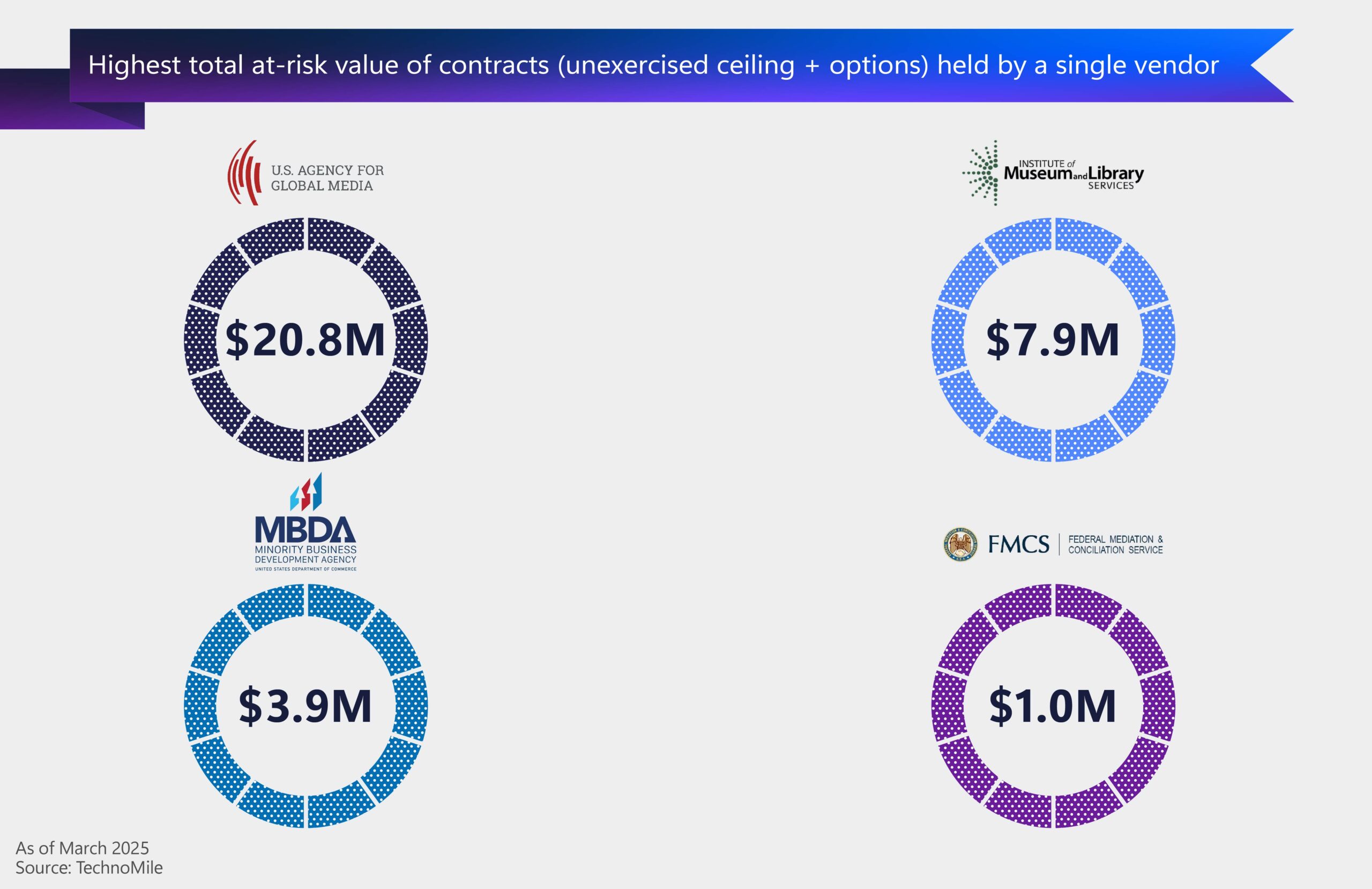
Looking across the four impacted agencies, miscellaneous foreign awardees (a term sometimes used in public databases when, for security purposes, the U.S. government desires to protect the name of local businesses supporting U.S. interests) have the highest level of exposure, with contracts through the USAGM worth $40.5M in unexercised ceiling + options value. The highest total at-risk value of contracts held by an individual vendor at each of the four impacted agencies breaks down as follows:
- USAGM – $20.8M total unexercised ceiling + options value, representing a Low DOGE Impact Score for this vendor
- IMLS – $7.9M total unexercised ceiling + options value, representing a Very High DOGE Impact Score for this vendor
- MBDA – $3.9M total unexercised ceiling + options value, representing a Moderate DOGE Impact Score for this vendor
- FMCS – $1.0M total unexercised ceiling + options value, representing a Very Low DOGE Impact Score for this vendor
The level of impact to each of these vendors’ overall business varies greatly, with DOGE Impact Scores related to this Executive Order ranging from Very High to Very Low among these 4 individual companies.
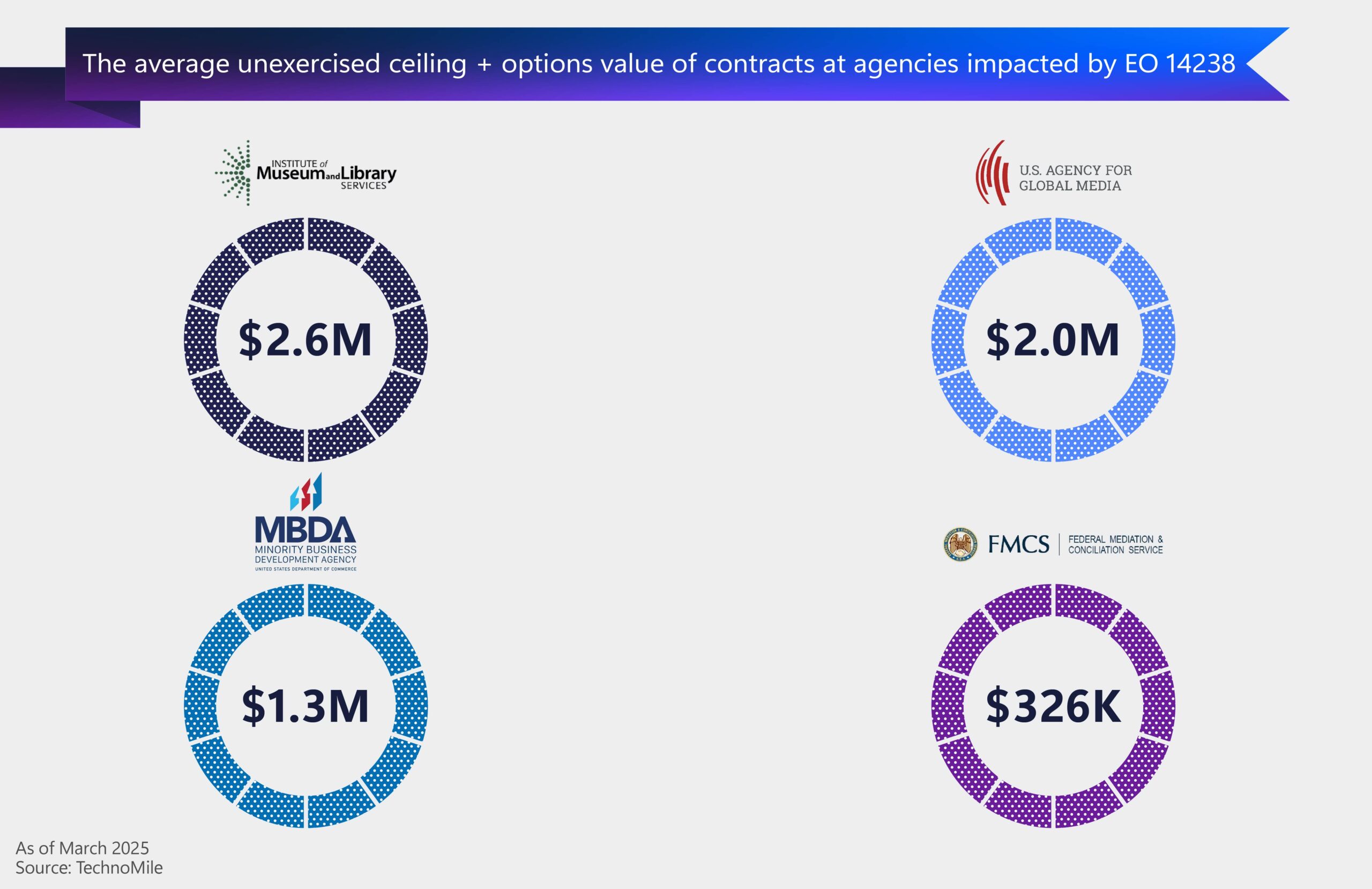
The average at-risk value (unexercised ceiling + options) associated with contracts at each impacted agency is:
- IMLS – $2.6M
- USAGM – $2.0M
- MBDA – $1.3M
- FMCS – $326K
Across the board, these averages skew higher due to a small handful of large awards at each of the four impacted agencies.
Key Takeaways
While DOGE’s focus on government efficiency and cost reduction has and will undoubtedly create new challenges for federal vendors, it can also create opportunities for those businesses that can adapt and innovate.
- New Efficiencies in B2G Companies – DOGE’s strong focus on cost efficiency could increase competition among federal contractors, necessitating that B2G organizations improve their own operational efficiency, including investment in back-office tools and technology used to win and manage federal contracts.
- Unlocking Innovation in B2G Companies – DOGE’s emphasis on modernization could cultivate even more innovation within organizations that do business with the government, and these cutting-edge strategies could result in a competitive advantage for vendors.
- Disruption in B2G Procurement Processes – DOGE’s initiatives could disrupt existing, often long-time relationships with agency personnel and require companies to adapt their business development and capture strategies and processes. Federal contractors need to be prepared for a wave of changes to procurement processes and regulations, agency POCs, contract requirements, and timelines.
Wrapping Up and Next Steps
TechnoMile, a veteran of the federal contracting community for over a decade, remains committed to supporting its customers and the broader industry as we navigate the current turbulent environment. While acknowledging the value of the DOGE initiative, TechnoMile emphasizes its dedication to providing members of the federal marketplace with essential data and insights to inform strategic decision making in this rapidly evolving landscape of government contracting.
If you’d like to receive a copy of the TechnoMile DOGE Impact Analysis: USAGM, MBDA, and Other Agencies Impacted by EO 14238, click here.